Timeline of French history
Appearance
(Redirected from Timeline of France history)
This is a timeline of French history, comprising important legal changes and political events in France and its predecessor states. To read about the background to these events, see History of France. See also the list of Frankish kings, French monarchs, and presidents of France.
5th century
[edit]| Year | Date | Event |
|---|---|---|
| 418 | Honorius gave land in Gallia Aquitania to his Visigoth federates in which to settle, forming the nucleus of the future Visigothic Kingdom under king Wallia and then his son and heir Theodoric I. | |
| 426 | Clodio, the earliest recorded king lord of the Salian Franks, began his reign. | |
| 448 | Clodio died. He was succeeded by Merovech. | |
| 451 | 20 June | Battle of Châlons: Romans, Visigoths under Theodoric I and their allies (including the Franks) definitively stop further Hunnic invasion in Gaul. Theodoric I died during the battle, he was succeeded by his son Thorismund who also had a decisive role during the battle. |
| 453 | Thorismund was murdered by his younger brother Theodoric II who succeeded him in the throne of the Visigothic Kingdom. | |
| 457 | Merovech died. His son Childeric I succeeded him as king. | |
| The Domain of Soissons, last Roman province of Gaul, was created with Aegidius as magister militum of the rump state. | ||
| 462 | Roman territory of Septimania was ceded to the Visigothic Kingdom. | |
| 463 | Aegidius and Childeric I defeated the invading Visigoths in Orléans. | |
| 464 | Aegidius died. His son Syagrius succeeded him as magister militum of the Domain of Soissons. | |
| 465 | Childeric I died. His son Clovis I succeeded him. | |
| 466 | Theodoric II was murdered and succeeded by his younger brother Euric as king of the Visigoths, declaring total independence from Roman influence and extending during his reign the Visigothic kingdom to most of the Iberian Peninsula. | |
| 485 | Euric died and was succeeded by his son Alaric II as king of the Visigoths. | |
| 486 | Battle of Soissons (486): A Frankish army under Clovis I defeated Syagrius and conquered the Domain of Soissons. Syagrius sought refuge in Alaric II's kingdom, but was later handed back to Clovis and beheaded. |
6th century
[edit]| Year | Date | Event |
|---|---|---|
| 507 | Battle of Vouillé: Clovis defeated a Visigoth army under Alaric II, and conquered Gallia Aquitania, thus forming the basis of modern-day France. | |
| 511 | 27 November | Clovis died. His kingdom was divided among his four sons; the territory with its seat at Paris went to Childebert I, the kingdom of Soissons went to Chlothar I, the kingdom of Orléans went to Chlodomer, and the kingdom of Rheims (Austrasia) went to Theuderic I. |
| 524 | 25 June | Battle of Vézeronce: The united armies of Clovis' sons inflicted a serious defeat on the Burgundian king Godomar. Chlodomer, the king of Orléans, was killed in battle. |
| Chlothar I, the king of Neustria, had two of Chlodomer's sons killed and forced the third into hiding thus inheriting his kingdom. | ||
| 534 | Theuderic I died, his son Theudebert I succeeded him as king of Austrasia. | |
| 547 | Theudebert I died, his son Theudebald succeeded him as king of Austrasia. | |
| 555 | Theudebald died, his realm passed to his great-uncle Chlothar I. | |
| 558 | 13 December | Childebert I died. His brother Chlothar I inherited his territory, thus becoming sole King of the Franks and reuniting Clovis' kingdom. |
| 561 | 29 November | Chlothar I died. The kingdom was divided among his four sons; Paris went to Charibert I, Burgundy to Guntram, Austrasia to Sigebert I, Soissons to Chilperic I. |
| 567 | November | Charibert I, king of Paris, died. With no heir, his realm was partitioned among his brothers. |
| 575 | Sigebert I of Austrasia died, his son, Childebert II, inherited his kingdom. | |
| 584 | September | Chilperic I of Soissons (Neustria) was assassinated. His infant son Chlothar II became king and his wife Fredegund became regent. |
| 592 | 28 January | Guntram of Burgundy died, his realm was passed on to Childebert II who was his adoptive son. |
| 8 December | Fredegund died so the 13-year-old Chlothar II started his reign as King of Neustria. | |
| 589 | 17 October | Charibert II, Franco-Lombard-Byzantine war over the Po Valley. The war was stopped by breaching dam in Cucca, transferred to the Lombards by the Byzantine emperor Maurice, which caused a severe flood, that blocked the franks' army advance into Italy. |
| 595 | Childebert II died, his kingdom was divided between his two sons. The kingdom of Austrasia went to Theudebert II, the kingdom of Burgundy to Theuderic II. |
7th century
[edit]| Year | Date | Event |
|---|---|---|
| 612 | Theudebert II, the king of Austrasia, was assassinated. His realm went to his brother Theuderic II, king of Burgundy. | |
| 613 | Theuderic II died. His bastard son Sigebert II briefly inherited his kingdom. | |
| Sigebert II, the king of Burgundy and Austrasia, was executed by Chlothar II, who inherited his kingdoms thus becoming sole king of the Franks. | ||
| 623 | Chlothar II gave Austrasia its independence under the kingship of his son, Dagobert I. | |
| 629 | Chlothar II died. Under an agreement forged after his death, Dagobert I succeeded him as king of Neustria but ceded what would become Aquitaine to his brother, Charibert II. | |
| 632 | 8 April | Charibert II died, possibly in an assassination ordered by his brother Dagobert I. His infant son Chilperic succeeded him as king of Aquitaine. |
| Chilperic was also killed. Dagobert I reacquired Aquitaine and became sole king of the Franks. | ||
| 639 | 19 January | Dagobert I died. Austrasia went to his son Sigebert III, and the Kingdom of Neustria and Burgundy to Clovis II. Both of these new kings are considered early rois fainéants. |
| 655 | Clovis II died. He was succeeded by his son Chlothar III (roi fainéant). | |
| 656 | 1 February | Sigebert III died. He was succeeded by Childebert the Adopted. |
| 661 | Childebert the Adopted died. Chlothar III annexed his kingdom, and became sole king of the Franks. | |
| Chlothar III died. His kingdom was divided between his two younger brothers; Austrasia to Childeric II, and Neustria to Theuderic III (roi fainéant). | ||
| 673 | Childeric II annexed Theuderic III's kingdom, and became sole king of the Franks. | |
| 675 | Childeric II died. Theuderic III inherited Neustria, Clovis III (roi fainéant) inherited Austrasia. | |
| 676 | Clovis III died. Theuderic III inherited his kingdom, becoming sole king of the Franks. | |
| 691 | Theuderic III died. He was succeeded by his son Clovis IV (roi fainéant). | |
| 695 | Clovis IV died. He was succeeded by his brother Childebert III. |
8th century
[edit]| Year | Date | Event |
|---|---|---|
| 711 | 23 April | Childebert died. He was succeeded by his son Dagobert III. |
| 715 | Dagobert died. He was succeeded by Chilperic II, the youngest son of Childeric II. | |
| 721 | 13 February | Chilperic died. He was succeeded by Theuderic IV, Dagobert III's son. |
| 732 | 10 October | Battle of Tours: Frankish and Burgundian soldiers under the Mayor of the Palace Charles Martel inflicted a significant defeat on the invading armies of the Umayyad Caliphate. |
| 737 | Theuderic died. Charles Martel was prevented succession. | |
| 741 | 22 October | Charles Martel died and his realm was divided between his two sons, Pepin the Short and Carloman, acting as Mayors of the Palace. |
| 743 | Childeric III was finally proclaimed king of the Franks thanks to Pepin the Short's influence, after the throne was vacant for 7 years. | |
| 747 | 15 August | Carloman renounced his position as Mayor of the Palace and withdrew to monastic life, his realm was given to his brother, Pepin the Short. |
| 751 | Childeric III was dethroned as the last king of the Merovingian dynasty, Pepin the Short was later crowned king of the Franks, thus starting the rule of the Carolingian dynasty. | |
| 768 | 24 September | Pepin the Short died. |
| 9 October | Charlemagne and Carloman I were proclaimed Kings of the Franks after their father's death. Each brother obtained half of their father's kingdom. | |
| 771 | 4 December | Carloman I died, Charlemagne annexed his kingdom. |
| 774 | Following successful conquests, Charlemagne became king of the Lombards. | |
| 795 | The Spanish March was created by Charlemagne as a buffer zone between the Frankish kingdom and Al-Andalus. |
9th century
[edit]| Year | Date | Event |
|---|---|---|
| 800 | 25 December | Charlemagne is crowned Imperator Augustus by Pope Leo III. |
| 811 | The treaty of Heiligen is signed between Charlemagne and the Danish king establishing the boundary between Denmark and the Frankish Empire. | |
| 812 | Frankish conquests in Spain were recognized by Emir Al-Hakam I. | |
| 814 | 28 January | Charlemagne dies and his only legitimate son, Louis the Pious, inherits the Empire. |
| 840 | 20 June | Louis the Pious dies, the Frankish Empire is claimed by his eldest son Lothair I, over his two brothers, Louis the German and Charles the Bald. |
| 843 | Treaty of Verdun: An alliance between Louis the German and Charles the Bald, and their victories over Lothair I, compelled the elder brother to negotiate the division of the Frankish Empire. It was divided in three parts; West Francia for Charles the Bald, Middle Francia for Lothair I and East Francia for Louis the German, hence laying the foundations of modern France and Germany. | |
| 875 | 29 December | Charles the Bald is crowned Holy Roman Emperor by Pope John VIII. |
| 876 | 8 October | Battle of Andernach: After Louis the German's death, Charles the Bald is badly defeated at Andernach by Louis' successor, Carloman of Bavaria, in an attempt to conquer his late brother's kingdom. |
| 877 | 6 October | Fleeing Northern Italy from Carloman's army, Charles the Bald falls ill and dies. His son Louis the Stammerer (Louis II) succeeds him as King of West Francia. |
| 879 | 10 April | Louis the Stammerer dies of illness. His two sons Louis III and Carloman II succeed him as joint kings of West Francia. |
| 880 | March | Louis III and Carloman II sign a treaty in Amiens dividing the kingdom between each other. Louis III obtains Neustria, Carloman II receives Burgundy and Aquitaine. |
| 882 | 5 August | Louis III dies, Carloman II becomes sole king of West Francia. |
| 884 | 12 December | Carloman II dies, his cousin Charles the Fat (Louis the German's youngest son) already king of East Francia, succeeds in the rule of West Francia reviving until his death the entire Carolingian Empire. |
| 888 | 13 January | Charles the Fat dies, with no legitimate or recognized heir, the Empire falls apart never to be reunited again. |
| February | Odo of France is crowned King of the Western Franks for his successes in fighting off the Normans. Ranulf II became King of Aquitaine. | |
| 898 | 1 January | Odo of France dies leaving no surviving heir. Charles the Simple, son of Louis the Stammerer, is declared king of West Francia, the Carolingian dynasty is thus again ruler of France. |
10th century
[edit]| Year | Date | Event |
|---|---|---|
| 911 | Charles signed the Treaty of Saint-Clair-sur-Epte with Rollo, the king of the Vikings, allowing their settlement in what would become the Duchy of Normandy. | |
| 922 | Charles was overthrown by a noble revolt and replaced by Robert I, Odo's brother. | |
| 923 | 15 June | Battle of Soissons (923): Robert was killed. Charles was captured by Rudolph, the duke of Burgundy. |
| Rudolph was elected king of France by an assembly of nobles. He left the Duchy of Burgundy to his brother. | ||
| 936 | 15 January | Rudolph died. He was succeeded by Louis IV, a son of Charles the Simple. |
| 954 | 10 September | Louis IV died. He was succeeded by his son Lothair. |
| 986 | 1 March | Lothair died. He was succeeded by his son Louis V. |
| 987 | 21 May | Louis V died. With no heir, Hugh Capet was chosen as his successor for his noble blood and military successes, thus ending the Carolingian dynasty's reign, and starting the Capetian dynasty. |
| 996 | 24 October | Hugh Capet died. He was succeeded by his son Robert II. |
11th century
[edit]| Year | Date | Event |
|---|---|---|
| 1004 | Robert annexed the Duchy of Burgundy. | |
| 1016 | 6 July | Battle of Pontlevoy |
| 1022 | Orléans heresy | |
| 1031 | 20 July | Robert died in a civil war against his sons. His second son, Henry I, succeeded him; his third, Robert I Capet, disputed the succession and led a new revolt. |
| 1032 | Henry purchased peace by reversing the annexation of the Duchy of Burgundy and giving it to his brother. | |
| 1047 | Battle of Val-ès-Dunes | |
| 1054 | Battle of Mortemer | |
| 1060 | 4 August | Henry died. The throne passed to his seven-year-old son, Philip I, with his wife Anne of Kiev acting as regent. |
| 1066 | Philip entered his majority. |
12th century
[edit]| Year | Date | Event |
|---|---|---|
| 1108 | 29 July | Philip died. He was succeeded by his late son Louis VI, the Fat. |
| 1131 | 25 October | Louis' son, the future Louis VII, the Young, was crowned the junior king and heir to the throne. |
| 1137 | 22 July | Louis VII became duke of Aquitaine by a political marriage to the duchess Eleanor. |
| 1 August | Louis the Fat died. Louis VII became king. | |
| 1152 | 21 March | The marriage of Louis VII and Eleanor was annulled. |
| 1180 | 18 September | Louis VII died. He was succeeded by his son Philip II. |
13th century
[edit]| Year | Date | Event |
|---|---|---|
| 1214 | 27 July | Battle of Bouvines: The French army defeated a combined English–Flemish force, enabling the kingdom to consolidate its control over Anjou, Brittany, Maine, Normandy and the Touraine. |
| 1223 | 14 July | Philip II died. He was succeeded by his son Louis VIII, the Lion. |
| 1226 | 8 November | Louis died. He was succeeded by his son Louis IX. |
| 1241 | June | Louis IX announced that the County of Poitiers would go to his brother Alphonse – offending Isabella of Angoulême, whose son would have inherited the territory had the English won the Battle of Bouvines. |
| 1242 | 20 May | Saintonge War: Henry III of England arrived with an army in support of Isabella's claim to Poitiers. |
| 1270 | 25 August | Louis IX died. He was succeeded by his son Philip III. |
| 1285 | 5 October | Philip III died. He was succeeded by his son Philip IV. |
| 1297 | Louis IX was canonized by Pope Boniface VIII, and was from then on better known as Saint Louis. He is the only French monarch to be declared a saint. |
14th century
[edit]| Year | Date | Event |
|---|---|---|
| 1302 | 18 May | Bruges Matins: The exiled citizens of Bruges, in Flanders, returned to their hometown and killed every Frenchman. |
| 11 July | Battle of the Golden Spurs: Flemish insurrectionists soundly defeated a French occupation force. | |
| 1314 | 29 November | Philip IV died. He was succeeded by his eldest son Louis X, the Headstrong. |
| 1316 | 5 June | Louis X died, possibly of poisoning. His wife was pregnant with their first child; his brother Philip V was appointed regent. |
| 15 November | Louis X's son was born John I, the Posthumous. He died 5 days later so Philip V was crowned king of France. | |
| 1322 | 3 January | Philip V died. With no heir, his younger brother Charles IV succeeded him. |
| 1328 | 1 February | Charles IV died. He was succeeded by his cousin Philip VI. |
| 1350 | 22 August | Philip VI died. He was succeeded by his son John II. |
| 1356 | 19 September | Battle of Poitiers a major battle of the Hundred Years' War between England and France. |
| 1357 | The States-General passed Étienne Marcel's Great Ordinance in an attempt to impose limits on the monarchy, in particular in fiscal and monetary matters. | |
| 1364 | 8 April | John II died. He was succeeded by his son Charles V. |
| 1380 | 16 September | Charles V died. He was succeeded by his son Charles VI. |
15th century
[edit]| Year | Date | Event |
|---|---|---|
| 1412 | 756 | Birth of Jeanne d'Arc (The Maid of Orleans) |
| 1415 | 13 August | Hundred Years' War (1415–1429): An English army under King Henry V landed in the north of France. |
| 1415 | 25 October | Battle of Agincourt: A major loss to the French in the Hundred Years' War (1415–1429)[1] |
| 1418 | 30 May | The army of John the Fearless, duke of Burgundy, captured Paris. The dauphin, the future Charles VII, fled. |
| 1419 | 20 September | John the Fearless was assassinated by companions of the dauphin. He was succeeded by his son Philip the Good, who would ally himself with the English against the French crown. |
| 1420 | 21 May | The Burgundians compelled Charles VI to sign the Treaty of Troyes, under which the throne was to pass to Henry V. |
| 1422 | 31 August | Henry V died. He was succeeded as King of England by his infant son Henry VI. |
| 21 October | Charles VI died. He was succeeded by his son Charles VII as king of France, a title disputed for Henry VI of England. | |
| 1438 | 7 July | Charles VII issues the Pragmatic Sanction of Bourges, requiring Church councils to be held every 10 years, and confirming the right of the Gallican Church to appoint ecclesiastical officials. |
| 1453 | 17 July | Battle of Castillon: In what is considered the last battle of the Hundred Years' War, the French inflict a decisive victory on the English army, eventually gaining back all English-held territories of France. |
| 1461 | 22 July | Charles VII died. He was succeeded by his son Louis XI. |
| 1483 | 30 August | Louis XI died. He was succeeded by his son Charles VIII. |
| 1494 | Charles VIII begins the first of the Italian Wars by invading Italy, but is eventually repulsed by the League of Venice. | |
| 1498 | 7 April | Charles VIII died. With no heir, he was succeeded by his father's second cousin, the Duke of Orléans, Louis XII. |
| 1499 | Louis XII begins the Italian War of 1499–1504 in order to press his claims to the Duchy of Milan and the Kingdom of Naples. |
16th century
[edit]| Year | Date | Event |
|---|---|---|
| 1508 | 10 December | War of the League of Cambrai: Representatives of the Papacy, France, and the Holy Roman Empire and Ferdinand I of Spain established the League of Cambrai, whose purpose was to defeat Venice and partition its territory. |
| 1514 | 18 May | Claude, the duchess of Brittany, was married to Francis of Angoulême, the heir to the French throne. |
| 1515 | 1 January | Louis died. Francis of Angoulême succeeded him as Francis I. |
| 1524 | 20 July | Claude died. Her eldest son Francis, Dauphin of France, became Duke of Brittany. |
| 1525 | 24 February | Battle of Pavia. Francis is defeated by Imperial forces under Charles V and captured. |
| 1532 | Francis I issued an edict incorporating Brittany into the kingdom of France. | |
| 1547 | 31 March | Francis I died. He was succeeded by his son Henry II. |
| 1559 | 3 April | Henry II ends the Italian Wars by signing the Peace of Cateau-Cambrésis and renouncing all his Italian claims. |
| 10 July | Henry II died. He was succeeded by his son Francis II. | |
| 1560 | 5 December | Francis II died. With no heir, he was succeeded by his brother Charles IX. |
| 1562 | 1 March | Massacre of Vassy begins The French Wars of Religion. |
| 1572 | 23 August | St. Bartholomew's Day massacre of French Protestants.[2] |
| 1574 | 30 May | Charles IX died. With no heir, he was succeeded by his brother Henry III. |
| 1589 | 2 August | Henry III died with no heir, thus ending the reign of the Valois branch of the Capetian dynasty. He was succeeded by Henry IV, the first monarch of the House of Bourbon. |
| 1598 | 13 April | Henry IV issued the Edict of Nantes to end the French civil war of religion.[3] |
17th century
[edit]| Year | Date | Event |
|---|---|---|
| 1610 | 14 May | King Henry IV died, by assassination Francois Ravaillac. He was succeeded by his eldest son Louis XIII, with de' Medici ruling as regent. |
| 1617 | Sixteen-year-old Louis exiled his mother and took control of the government. | |
| 1624 | August | Louis took Cardinal Richelieu as his chief minister. |
| 1643 | 14 May | Louis died. His five-year-old son Louis XIV succeeded him. Cardinal Mazarin became regent. |
| 1648 | August | Fronde: Cardinal Mazarin ordered the arrest of the leaders of the parlement of Paris, which provoked widespread rioting. |
| 24 October | Thirty Years' War: The Peace of Westphalia ended the war with France obtaining the better bargain, and annexing eastern territories. | |
| 1659 | November | Franco-Spanish War: Victorious France signs the Treaty of the Pyrenees with Spain and annexes northern Catalonia and French Flanders. The war confirms France as the dominant continental power and Bourbon strength over the Habsburgs. |
| 1668 | 2 May | Treaty of Aix-la-Chapelle: end of the War of Devolution. France obtains Lille and other territories of Flanders from Spain. |
| 1678 | Treaties of Nijmegen: A series of treaties ending the Franco-Dutch War. France obtains the Franche-Comté and some cities in Flanders and Hainaut (from Spain). | |
| 1684 | 15 August | Truce of Ratisbon: End of the War of the Reunions. France obtains further territories in the north-west from Spain. |
| 1697 | 20 September and 30 October | Treaty of Ryswick: End of the Nine Years' War between France and the Grand Alliance. Territorial changes were made in Europe and the colonial empires of the countries involved. |
18th century
[edit]| Year | Date | Event | Image |
|---|---|---|---|
| 1701 | 9 July | Battle of Carpi: In what was the first battle of the War of the Spanish succession, Austrian invaders encountered the French army at Carpi, and defeated them. | |
| 1713 | 11 April | War of the Spanish Succession: France and England signed the Treaty of Utrecht, under which Philip V of Spain renounced for himself and his descendants any right to the French throne. Similarly, possible heirs to the French crown renounced all rights to the rulership of Spain. | |
| 1713 | 7 March | War of the Spanish Succession: The Treaty of Rastatt ended hostilities between France and Austria. | |
| 1715 | 1 September | Louis XIV died of gangrene. His five-year-old great-grandson Louis XV succeeded him, with his nephew Philippe II, Duke of Orléans, acting as regent. | |
| 1720 | 17 February | Treaty of The Hague: France and its allies signed a treaty with Spain, thus ending the War of the Quadruple Alliance. | |
| 1723 | 15 February | Louis XV Became the new King of France. | |
| 1738 | 18 November | Treaty of Vienna: The signing of the treaty ended the War of the Polish Succession. France gained the Duchy of Lorraine and Bar. | |
| 1744 | 5–10 October | Louis XV visits Strasbourg. It is the first time since 1681 that a monarch goes to Alsace. Sumptuous festivals are organized throughout the city, the wine flows in the fountains of the squares, fireworks are fired, and a huge screen 12 meters high and 30 wide is set up in front of the Rohan Palace to partially hide the little-appreciated Gothic houses. This visit will leave the city ecstatic and indebted for many years. |  |
| 1745 | 23 February | The Dauphin Louis of France marries Infanta Maria Teresa Rafaela of Spain at the Chapel of Versailles. |  |
| 25–26 February | Yew Tree Ball: Masked ball given by the Louis XV in the Grand Gallery of the Chateau of Versailles, on the occasion of the marriage of Louis, Dauphin of France with Maria Teresa, Infanta of Spain. Fifteen thousand people attended including Jeanne Antoinette Poisson who met with the King for a second time. |  | |
| 11 May | War of the Austrian Succession: French forces defeat an Anglo-Dutch-Hanoverian army at the Battle of Fontenoy; Louis XV, and his son, the Dauphin, were present at the battle. |  | |
| 6 December | Jean-Baptiste de Machault d'Arnouville becomes Controller-General of Finances at the age of forty-four. |  | |
| 1746 | 5 August | Christophe de Beaumont becomes Archbishop of Paris at the age of forty-three. |  |
| 1748 | 18 October | Treaty of Aix-la-Chapelle: The signing of the treaty, dictated by France and Britain, ended the War of the Austrian Succession. The French population was dissatisfied with the terms, considering the French conquests during the war. | |
| 1763 | 10 February | Seven Years' War: France and some allied and enemy nations sign the Treaty of Paris ending the Seven Years' War, resulting in a major blow on French colonial possessions. | |
| 1768 | 15 May | Treaty of Versailles: In order to pay its debts and being no longer able to suppress struggle for independence, the Republic of Genoa ceded Corsica to France. Corsica remained French ever since. | |
| 1770 | 16 May | The Dauphin Louis Auguste of France marries Archduchess Maria Antonia of Austria at the Chapel of Versailles. |  |
| 1774 | 10 May | Louis XV died. He was succeeded by his grandson Louis XVI. | |
| 1778 | February | France recognizes the American colonies as independent from the United Kingdom, making its involvement in the American War of Independence official. France will wage war with the United Kingdom in the Americas and other parts of the world assuring victory with the Peace of Paris. | |
| 1786 | 21–23 June | Louis XVI visits Cherbourg to see the construction site of the dam and the arsenal. |  |
| 1789 | 14 July | The French Revolution began with the storming of the Bastille. |  |
| 1793 | 21 January | Former King of France Louis XVI was executed by guillotine. The National Convention had taken power a few months earlier. |  |
| 7 June | Revolutionary Paris sections took over the Convention, calling for administrative and political purges, starting 1-year and 2 months of what is known as the Reign of Terror. | 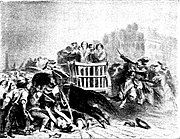 | |
| 16 October | Former Queen of France Marie Antoinette was executed by guillotine. |  | |
| 1795 | 2 November | The Directory seized power over the Convention. |  |
| 1797 | 17 October | War of the First Coalition – The Treaty of Campo Formio is signed between France and Austria following decisive French military victories. The treaty marks the collapse of the First Coalition, composed of European powers which tried to contain Revolutionary France. | |
| 1798 | 7 July | The United States Congress rescinded treaties with France, a moment considered as the semi-official beginning of the Quasi-War. | |
| 1799 | 9 November | Coup of 18 Brumaire: General Napoleon Bonaparte overthrew the French Directory, replacing it with the French Consulate. |
19th century
[edit]| Year | Date | Event | Image |
|---|---|---|---|
| 1801 | 9 February | War of the Second Coalition: The Treaty of Lunéville was signed after the victory of the French Republic against the Second Coalition states (led by the Austrian and Russian Empires), marking the end of the war with only Britain left fighting France. |  |
| 15 July | The Concordat of 1801 was signed between Napoleon and Pope Pius VII, solidifying the Roman Catholic Church as the majority church of France, returning most of its civil status, and restoring much power to the papacy. |  | |
| 1802 | 3 February | Saint-Domingue expedition: French Army General Charles Leclerc and the first 5,000 of 20,000 troops arrive at Cap-François (now Cap-Haïtien) to suppress Toussaint L'Ouverture and the rebellion of the black population in Haiti. |  |
| 25 March | War of the Second Coalition: The Treaty of Amiens established a peace between France and the United Kingdom. |  | |
| 1803 | 2 May | Louisiana Purchase: France sold Louisiana to the United States of America, renouncing its last territorial possessions on continental North America. |  |
| 18 November | Battle of Vertières: The viscount of Rochambeau was defeated and forced to surrender to the revolutionary army of Jean-Jacques Dessalines. | ||
| 1804 | 1 January | Haitian Revolution: Dessalines declared the independence of Haiti. |  |
| 18 May | Napoleon was declared Emperor by the Senate, marking the beginning of the First French Empire and the end of the French Consulate. |  | |
| 2 December | Napoleon crowned himself Emperor in Notre-Dame de Paris. Napoleon had Pope Pius VII in attendance to indicate approval of the Church. |  | |
| 1805 | 2 December | War of the Third Coalition: The French Empire is victorious at the decisive Battle of Austerlitz which marks the end of the Third Coalition (Austria, Russia, United Kingdom, Sweden and others) against France and its client states. |  |
| 1806 | 12 July | Napoleon dissolved the Holy Roman Empire, and created the Confederation of the Rhine, a union of French client states composed of 16 states in present-day Germany. | |
| 1807 | 14 June | War of the Fourth Coalition: The French Empire is victorious at the decisive Battle of Friedland which marks the end of the Fourth Coalition (mainly Prussia, Russia, Saxony, Sweden, and the United Kingdom) against France and its client states. | 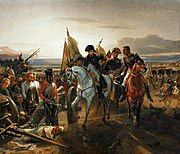 |
| 1808 | 2 May | Beginning of the Peninsular War which will last until Napoleon's defeat against the Sixth Coalition in 1814. |  |
| 1809 | 5 July | War of the Fifth Coalition: The French Empire is victorious at the decisive Battle of Wagram which marks the end of the Fifth Coalition (mainly the Austrian Empire and the United Kingdom) against France and its client states. (to 6 July) | 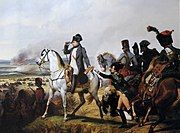 |
| 1812 | 14 September | War of the Sixth Coalition: The Fire of Moscow marks the beginning of French retreat after the French invasion of Russia. The First French Empire reached the height of its power and declined henceforth with the disastrous Battle of Berezina. The Sixth Coalition will go on to win the war and Napoleon will be exiled in 1814 to Elba. | 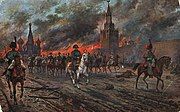 |
| 1813 | 26–27 August | Battle of Dresden, took place around Dresden, Germany, resulting in a French victory under Napoleon against forces of the Sixth Coalition of Austrians, Russians and Prussians under Field Marshal Schwartzenberg. However, Napoleon's victory was not as complete as it could have been. Substantial pursuit was not undertaken after the battle, and the flanking corps was surrounded and forced to surrender a few days later at the Battle of Kulm. | 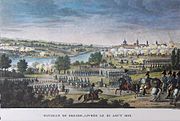 |
| 1813 | 16–19 October | Battle of Leipzig, 600,000 soldiers are involved in the largest battle in Europe prior to World War I. Coalition routs the French. |  |
| 1814 | 4 April | Forced abdication of Napoleon and subsequent exile to Elba. |  |
| 1814 | 24 April | First Restoration: The House of Bourbon was briefly restored with Louis XVIII as King of France in an intermediate period of the Napoleonic Wars. |  |
| 1815 | 21 January | The transfer of the coffins of King Louis XVI of France and his wife, Marie Antoinette, to the church St. Denis in Paris. |  |
| 26 February | Hundred Days: Napoleon escapes from Elba. |  | |
| 7 March | Hundred Days: Napoleon greeted by the 5th Regiment at Grenoble after his escape from Elba. |  | |
| 18 June | Hundred Days: Battle of Waterloo: Napoleon is defeated by Seventh Coalition armies, definitively ending the First French Empire and the Napoleonic Wars, and marks the start of almost half a century of peace throughout Europe. |  | |
| 7 July | Second Restoration: With Napoleon exiled in Saint Helena, the House of Bourbon was again restored. Louis XVIII became King of France until his death on 16 September 1824. |  | |
| 1820 | 13 February | Assassination of the Duke of Berry |  |
| 1821 | 5 May | Death of Napoleon. | 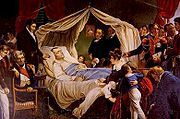 |
| 1823 | April | French invasion of Spain: France started its invasion of Spain, eventually succeeding and restoring the monarchy, ending the Liberal Triennium. |  |
| 1830 | July | July Revolution or French Revolution of 1830: the conservative House of Bourbon is overthrown and replaced by the more liberal Orleans Monarchy with Louis-Philippe becoming King of France. |  |
| 3 February | End of the Greek War of Independence; Greece wins their independence when Russia, France and Britain finally agree on the terms of the Treaty of London | ||
| 1831 | 22 November | First Canut revolt: first clearly defined worker uprising of the Industrial Revolution. |  |
| 1832 | 5 June | June Rebellion: Unsuccessful Anti-monarchist insurrection in Paris. | 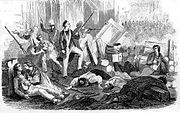 |
| 1835 | 28 July | The Fieschi attentat: In Paris, the assassination of Louis Philippe I is attempted by Giuseppe Marco Fieschi using a home-made volley gun. Eighteen are killed but the King escapes with a minor wound. |  |
| 1839 | 9 March | Pastry War: Victorious French troops withdraw from Mexico after their demands were satisfied. |  |
| 1848 | February | February Revolution or French Revolution of 1848: Republican riots forced King Louis-Philippe to abdicate and flee to England. |  |
| 20 December | Louis Napoleon Bonaparte starts his term as the first president of the French Republic. | 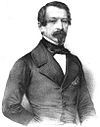 | |
| European Revolutions of 1848 | |||
| 1851 | 2 December | Exactly one year after his coup d'état, president Louis-Napoléon Bonaparte becomes Napoleon III of France, ending the Second Republic and creating the Second French Empire with him as emperor. | |
| 1853–1856 | 28 March | Crimean War: France and Britain formally declared war on Russia. | |
| 1860 | Following the Franco-Sardinian victory over the Austrian Empire in the Second Italian War of Independence, Italian regions of Nice and Savoy were transferred to the French Empire as a reward. | ||
| 18 October | Second Opium War: British and French troops entered the Forbidden City in Beijing. | ||
| 1866 | 31 May | French intervention in Mexico: French troops start withdrawing from the country. | |
| 1870–1940 | Third Republic | ||
| 1871 | 10 May | The end of the Franco-Prussian War: France's loss marked the downfall of Napoleon III and led to the end of the Second French Empire. The Third Republic was subsequently declared and Napoleon III went into exile in the United Kingdom until his death. | |
| 26 March | The Paris Commune was declared and lasted 2 months before being violently suppressed by the French army. | ||
| 31 August | Adolphe Thiers began his term as president of France. |  | |
| 1873 | 24 May | Patrice de Mac-Mahon began his term as president of France. |  |
| 1879 | 30 January | Jules Grévy began his term as president of France. |  |
| 1887 | 28 January | Work begins on the foundations of the Eiffel Tower. |  |
| 3 December | Marie François Sadi Carnot began his term as president of France. |  | |
| 1888 | 20 March | First Stage of the Eiffel Tower is completed. |  |
| 21 August | Second Stage of the Eiffel Tower is completed. |  | |
| 1889 | 15 May | The Eiffel Tower is opened to the public. | 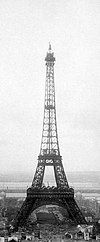 |
| 26 May | The Eiffel Tower lifts begin service. | 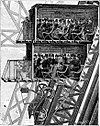 | |
| 1894 | 4 January | The Franco-Russian Alliance was confirmed. | |
| 27 June | Jean Casimir-Perier began his term as president of France. | 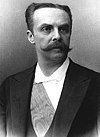 | |
| November | The Dreyfus affair begins, creating a scandal which will mobilize intellectuals and divide the French population for a decade. | ||
| 1895 | 17 January | Félix Faure began his term as president of France. | 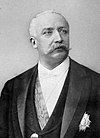 |
| 1899 | 18 February | Émile Loubet began his term as president of France. |  |
20th century
[edit]| Year | Date | Event |
|---|---|---|
| 1904 | 8 April | The Entente Cordiale was signed, as an agreement mainly based on imperial issues. With the Anglo-Russian Entente of 1907, France, Britain and Russia were known as the Triple Entente in opposition to the Triple Alliance of Germany, Austria and Italy.[4] |
| 1905 | 15 December | The 1905 French law on the separation of Church and State ended government funding of religious groups.[5] |
| 1906 | 18 February | Armand Fallières began his term as president of France. |
| 1913 | 18 February | Raymond Poincaré began his term as president of France.[6] |
| 1914 | 3 August | French entry into World War I: Germany declared war on France. |
| 1918 | 11 November | World War I: The first armistice at Compiègne was signed between France and Germany, ending the Great War. France regained Alsace-Lorraine. |
| 1923 | January | Beginning of Franco-Belgian occupation of the Ruhr. |
| 1924 | 13 June | Gaston Doumergue began his term as president of France. |
| 1931 | 13 June | Paul Doumer began his term as president of France. |
| 1932 | 10 May | Albert Lebrun began his term as president of France. |
| 1934 | 6 February | Riots by far-right leagues were repressed by the state in what was considered as a failed coup d'état, and a major political crisis of the Third Republic. |
| 1937 | 25 May | International Exposition of Art and Technology in Modern Life was opened in Paris in 1937.  |
| 1939 | 3 September | Second World War: France declared war on Germany. |
| 7 September | Saar Offensive | |
| 1940 | 9 May | The Battle of France begins. |
| 18 June | Charles de Gaulle makes his Appeal of 18 June. | |
| 25 June | Second World War: The Second Armistice at Compiègne was put into effect after the French and British armies were heavily defeated in the Battle of France by the Germans. The northern half of France was occupied by German forces and the southern part was governed by the collaborationist Vichy Government led by Marshal Philippe Pétain. | |
| 27 October | Battle of Gabon | |
| 1941 | 8 June | Syria–Lebanon campaign |
| 1942 | 11 November | Case Anton |
| 1944 | 6 June | Normandy landings |
| 25 August | Second World War – Liberation of Paris: In what is considered the last battle of the Allied Operation Overlord, Allied forces, and in particular Free French Forces and the French Resistance, liberated Paris from German occupation as a strong symbolic effort to restore French honor, tarnished by the fast defeat. | |
| 1945 | 22 April | Capture of the Sigmaringen enclave |
| 24 October | Establishment of the United Nations (UN) with France having a veto on the Security Council. | |
| 8 May | Complete liberation of the rest of France as the Allies finish off the few pockets of German Resistance | |
| 1946 | 13 October | France adopted the constitution of the Fourth Republic. |
| 1947 | 16 January | Vincent Auriol began his term as the first president of the Fourth Republic. |
| 1951 | 18 April | Treaty of Paris: Establishment of the European Coal and Steel Community (ECSC) between France, West Germany, Italy, and the Benelux countries, producing diplomatic and economic stability in Europe between former enemy states. The ECSC is credited as one of the major "ancestors" of the European Union. |
| 1954 | 16 January | René Coty began his term as president of France. |
| 1 August | End of the 8-year long Indochina War. The following Geneva Conference (1954) agreed to dividing Vietnam. France departed from the country in a move that started worldwide decolonization of the French colonial empire. | |
| 1957 | 25 March | Treaties of Rome: The Inner Six countries (including France) signed two treaties establishing the European Economic Community (EEC) and the European Atomic Energy Community (EAEC). |
| 1959 | 8 January | Charles de Gaulle became the first president of the Fifth Republic, whose new constitution greatly increased the President's powers (as opposed the Third and Fourth Republics, in which the office of President of the Republic was a largely ceremonial and powerless one). |
| 1962 | 19 March | End of the Algerian War, Algeria, a French colony, obtained independence from France after almost 8 years of official strife. |
| 1965 | 8 April | Merger Treaty: this treaty merged the ECSC, the EEC and the EAEC into a single institutional structure known as the European Community. |
| 1967 | 24 July | Charles de Gaulle's famous "Vive le Québec libre" speech provoked a diplomatic crisis in Canada–France relations. |
| 1968 | May–June | May '68: a series of protests, occupations and strikes against capitalism, consumerism and traditional institutions, values and order (part of the 1968 worldwide protests). |
| 1969 | 20 June | Georges Pompidou began his term as president of France. |
| 1974 | 27 May | Valéry Giscard d'Estaing began his term as president of France. |
| 1981 | 21 May | François Mitterrand began his term as president of France. |
| 1986 | 17 February | Single European Act : a major revision of the Treaty of Rome to establish a common market by the end of 1992. (to 28 February 1987) |
| 1992 | 7 February | Maastricht Treaty: Members of the European Community (including France) signed a treaty creating what is now known as the European Union. |
| 1995 | 17 May | Jacques Chirac began his term as president of France. |
| 1998 | 12 July | France won the 1998 World Cup of football on home soil. This was their first FIFA World Cup title. |
| 31 December | Introduction of the euro: the exchange rates between the euro and legacy currencies (the franc for France) in the eurozone became fixed. |
21st century
[edit]| Year | Date | Event |
|---|---|---|
| 2001 | "French government adopts a law that requires every French Web page to be officially archived."[7] | |
| 2002 | 2 January | Introduction of the first euro coins and bills replacing the legacy currency, the franc. |
| 2004 | 15 March | A law bans "conspicuous" religious symbols in schools. The law is renowned to target the Islamic headscarf, but forbids also Christian and Jewish symbols. |
| 2005 | October and November | 2005 French riots. |
| 2007 | 15 May | Nicolas Sarkozy began his term as president of France. |
| 2010 | 14 September | A law to ban face covering from public space is passed by the Senate of France. The law had been previously passed by the National Assembly of France on 13 July 2010. The law is renowned to target the burqa and the niqāb, that President Sarkozy declared "not welcome" in France. |
| 2011 | 19 March | France leads the NATO intervention in Libya to overthrow Muammar Gaddafi. The Libyan leader is eventually killed on 20 October 2011. |
| 2012 | 6 May | François Hollande began his term as president of France. |
| 2013 | 11 January | Beginning of the French intervention in Mali against Islamic militants known as Operation Serval (11 January 2013 – 15 July 2014) |
| 18 May | Same-sex marriage becomes legal in France, the 13th country worldwide to allow it. | |
| 2015 | 7–9 January | 17 people, including three police officers, are killed in two terrorist attacks by Muslim terrorists; the Charlie Hebdo shooting targeted a magazine which published cartoons of Mohammed.[8] |
| 10–11 January | Some 3.7 million people demonstrate nationwide against terrorism and for freedom of speech following the terrorist attack at Charlie Hebdo. | |
| 13 November | ISIS sends 3 teams of suicide bombers to attack multiple targets in Paris including a soccer stadium, a concert, and several restaurants; over 120 dead. | |
| 2016 | 14 July | 2016 Nice truck attack: A cargo truck was deliberately driven into crowds of people celebrating Bastille Day on the Promenade des Anglais, Nice resulting in the deaths of 86 people and the injury of 458 others. |
| 2017 | 14 May | Emmanuel Macron began his term as president of France. |
| 2018 | 15 July | France wins the 2018 FIFA World Cup. |
| 17 November | The start of the Yellow vests protests. | |
| 2020 | 16 October | Murder of Samuel Paty |
| 2024 | 18 January | 2024 French farmers' protests are held against French and EU agricultural policy.[9][10] |
See also
[edit]References
[edit]- ^ Buellesbach, Alfred. Battlescapes: A photographic Testament to 2,000 years of Conflict. Oxford: Osprey Publishing, 2009.
- ^ Arlette Jouanna, The Saint Bartholomew's Day massacre: The mysteries of a crime of state (Manchester University Press. 2007) online
- ^ Ruth Kleinman, "Changing Interpretations of the Edict of Nantes: The Administrative Aspect, 1643-1661." French Historical Studies 10.4 (1978): 541-571 online
- ^ P. M. H. Bell, France and Britain, 1900–1940: Entente and Estrangement (1996).
- ^ Murat Akan, The Politics of Secularism: Religion, Diversity, and Institutional Change in France and Turkey (Columbia University Press, 2017).
- ^ Gordon Wright, Raymond Poincaré and the French presidency (1967).
- ^ Cornell University Library (2003). "Digital Preservation and Technology Timeline". Digital Preservation Management. USA. Archived from the original on 6 August 2015. Retrieved 3 August 2015.
- ^ "Gun attack on French magazine Charlie Hebdo kills 11". BBC News. 7 January 2015. Archived from the original on 31 May 2018. Retrieved 21 June 2018.
- ^ ""On va mener une action qui va marquer les esprits": les agriculteurs veulent bloquer les autoroutes ce jeudi" (in French). ladepeche.fr. Retrieved 24 January 2024.
- ^ "Colère des agriculteurs : les revendications de la profession" (in French). L'Express. 24 January 2024. Retrieved 24 January 2024.
Bibliography
[edit]In English
[edit]- Langer, William. An Encyclopedia of World History (5th ed. 1973); highly detailed outline of events online free
- Morris, Richard B. and Graham W. Irwin, eds. Harper Encyclopedia of the Modern World: A Concise Reference History from 1760 to the Present (1970) online
- Charles E. Little (1900), "France", Cyclopedia of Classified Dates, New York: Funk & Wagnalls
- Henry Smith Williams, ed. (1908). "Chronological Summary of the History of France". France, Netherlands. Historians' History of the World. Vol. 13. London: Hooper & Jackson. hdl:2027/njp.32101063964827.
- Benjamin Vincent (1910), "France", Haydn's Dictionary of Dates (25th ed.), London: Ward, Lock & Co.
- Echard, William E. Historical Dictionary of the French Second Empire, 1852–1870 (1985)
- Hutton, Patrick H. and Amy J. Staples, et al. Historical Dictionary of the Third French Republic, 1870–1940 (2 vol 1986)
- Northcutt, M. Wayne. Historical Dictionary of the French Fourth and Fifth Republics, 1946–1991 (1992)
- Kibler, et al. Medieval France: An Encyclopedia (1995)
- Gino Raymond (2008). "Chronology". Historical Dictionary of France. Scarecrow Press. ISBN 978-0-8108-6256-2.
- Graham Robb (2008). "Chronology". Discovery of France: A Historical Geography. W. W. Norton. ISBN 978-0-393-06882-5.
In French
[edit]- Jules Michelet (1834). Tableau chronologique de l'histoire moderne (in French) (2nd ed.). Brussels: Hauman – via HathiTrust. (+ via Google Books)
- Manuel chronologique (in French). Paris: Société pour la propagation de l'éducation libre. 1877. (coverage includes France)
- Charles Dreyss (1883). Chronologie universelle. Histoire universelle (in French) (5th ed.). Paris: Hachette – via HathiTrust. (coverage includes France) (+ pt.1, pt.2 via Google Books)
- Patrick Boucheron, ed. (2017). Histoire mondiale de la France [Global History of France] (in French). Paris: Éditions du Seuil. ISBN 978-2-02-133629-0.
External links
[edit]- H-France free daily email discussions and book reviews; oriented to scholars & graduate students since 1991.
- France Profile: Timeline, BBC News, 8 March 2012
- "French History Timeline". Archived from the original on 1 March 2009 – via University of North Carolina in Greensboro. (compiled circa 2000?)
